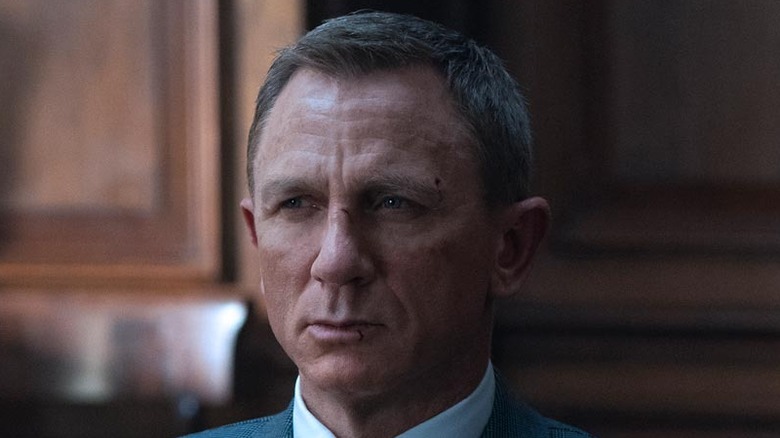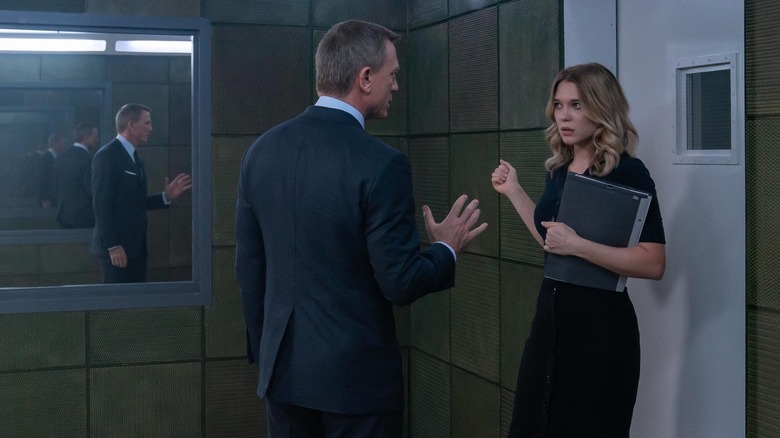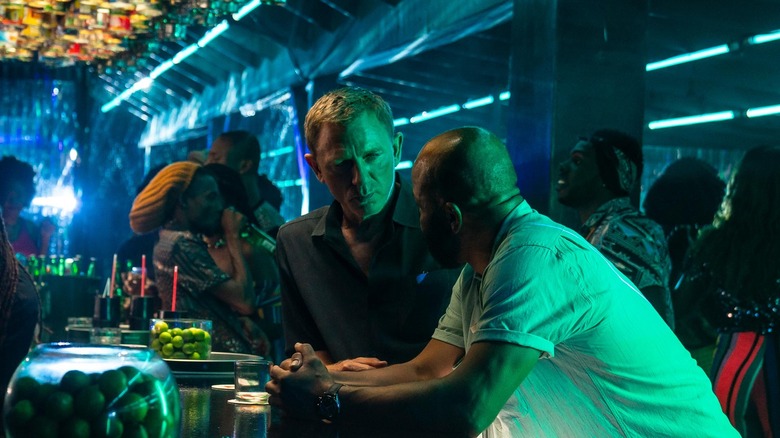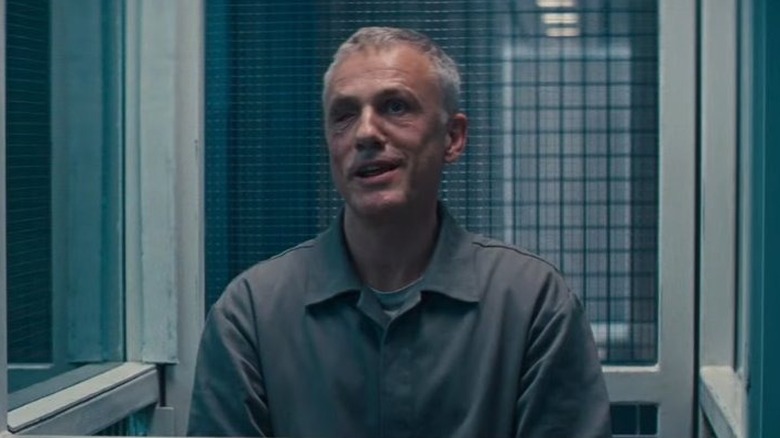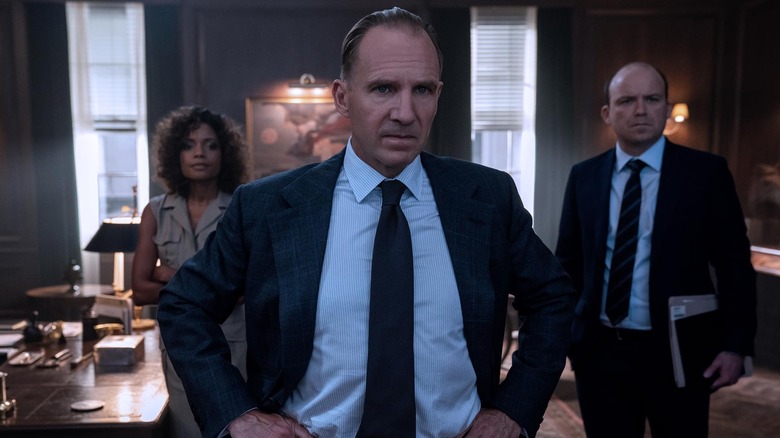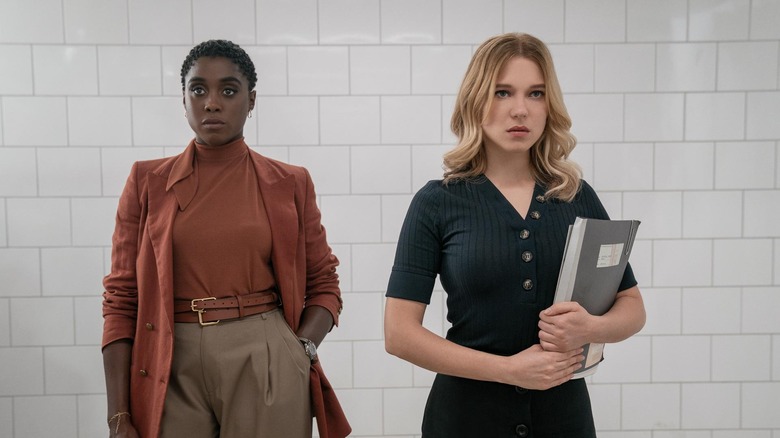Biggest Unanswered Questions In No Time To Die
Spoiler warning: This article contains major plot details for "No Time to Die."
"No Time to Die," Daniel Craig's final outing as James Bond, ties up a lot of loose ends from his tenure onscreen as the renowned superspy. it's an epic, near-three-hour swan song that traces elements of its plot all the way back to his debut in "Casino Royale," threading its narrative through each of his subsequent chapters. Though this is the first Bond film to end with an emphatic period rather than a teasing set of ellipsis, those who see the film will surely sit through the closing credits with some lingering curiosity about the dangling plot threads left unspooled.
The film begins right after the cliffhanger ending of "Spectre" before jumping ahead five years, mirroring the real world time that has passed between installments, catching up with a retired James Bond pulled back into the world of espionage to help his old friend, CIA field officer Felix Leiter (Jeffrey Wright), recover missing scientist Obruchev (David Dencik), a man also sought after by MI6. Bond must contend with his replacement, new 007 Nomi (Lashana Lynch), his arch-rival Ernst Stavro Blofeld (Christoph Waltz), and new foe Lyutsifer Safin (Rami Malek), all while settling his differences with Dr. Madeleine Swann (Léa Seydoux), the woman we last saw him ride off into the sunset with.
When the dust settles, the day has been saved, and this era of Bond has drawn to a close, we still have some unanswered questions.
How long had Blofeld been planning his Vesper tomb trap?
As previously mentioned, "No Time to Die" possesses a truly epic length, and its pre-opening credits sequence telegraphs its marathon runtime well. At 27 minutes until Billie Eilish's theme song is heard, it doubles the length of the former longest opening sequence, from "The World is Not Enough." But the most stirring part of this extended set piece comes when Bond, at the behest of Madeleine, visits the final resting place of Vesper Lynd (Eva Green), the love interest who betrayed him in "Casino Royale." Madeleine wants to start a new life with James, and that requires closing the chapters behind them.
For Madeleine, that means telling James all the secrets she's never shared. But for James, that means forgiving a dead woman he still loves. When he gets to her grave, it's been booby-trapped and explodes in his face, setting his quest in motion and severing his trust with Madeleine, who he now believes must be Vesper 2.0 having lured him into this mess.
Later in the film, Blofeld confesses to Bond that, as in "Spectre," he was the author of this particular pain point, knowing Bond would eventually visit her tomb and that all he had to do was bide his time. What's not explicitly spelled out is just how long he had been planning this. At that point in the film, Blofeld has been in prison for half a decade, so did he have his long-distance henchmen rig up the cemetery with explosives even before he wound up incarcerated, leaving them there to grow old waiting to explode? Or were his men on the outside just keeping tabs on Bond in the hopes an emotional ultimatum in his relationship would lead to him being at the right place at the wrong time?
What was Madeleine's full history with Safin?
Much of the film's intrigue surrounds the true nature of Madeleine's backstory. In one particularly cutting moment, as a hail of gunfire chases them in his car, Bond cruelly points out to Madeleine that everyone has secrets, but they hadn't yet gotten to hers. The film's opening flashback reveals a fuller portrait of a plot point originally revealed in "Spectre," that Madeleine's mother was killed by one of her father Mr. White's enemies while she was a child hiding upstairs. Here, we see that enemy was Lyutsifer Safin, Malek's new Bond villain.
We find out Safin himself had his own family brutally slaughtered by White, so his decision for revenge was inevitable. But when child Madeleine fights back against his attack and he chases her to the point she collapses under a frozen lake, Safin chooses to rescue her, saving her life. In present day, after the five-year time jump between the opening set piece and the main thrust of the film, Safin reappears in Madeleine's life and makes her an unwitting pawn in his master plan, making it clear he's been obsessed with her since that fateful day.
But the film is built around the premise that the full details of their connection will prove devastating to James. In a way, they do, because Madeleine and James have lost years of their lives not even speaking because the plot's circumstances convinced him she wasn't to be trusted, which couldn't be further from the truth.
We just never find out more about Safin and Madeleine's connection. He must have taken her to safety after retrieving her from under the ice, but did he help raise her for a time? He claims to have kept a close watch on her over the years, but was she ever aware? Was there more to this shared history, or was it all just a misdirect?
What was Felix Leiter up to in Skyfall and Spectre?
After appearing in both "Casino Royale" and "Quantum of Solace" as franchise stalwart Felix Leiter, Bond's American bestie Jeffrey Wright was nowhere to be seen in the ensuing two sequels. He returns here as the catalyst for much of the film's plot, and when he does, Leiter and Bond seem even closer and chummier than they did when he was still a brand new 00-agent.
This mission the two men embark on together proves to be their last, as Leiter dies in front of Bond, drowning and suffering of gunshot wounds from fellow spook Logan Ash (Billy Magnusson), who betrayed them both. It proves to be one of the film's most affecting moments, largely because of the palpable chemistry Craig and Wright share, the way these two performers imply years of friendship and brotherhood we've never truly gotten to see within the texts of the films.
Bond being an international agent, it's presumed he and Leiter worked on many, many unseen missions in between his last appearance and this film, but we still wonder what he was up to as a rogue former MI6 agent run amok in "Skyfall" and as Spectre became such a powerful force for terrorism. Maybe they just had a lot of cookouts together?
How did MI6 not know about Blofeld's bionic eye?
In a key moment in the film, Safin uses the scientist Obruchev to alter a weaponized disease Blofeld was planning to use to kill Bond, making it backfire and kill every living member of Spectre. This happens at a ball thrown for the evil organization, with Blofeld, in prison, attending via the connection from his bionic eye to a mirrored one out in the real world. When Bond has to explain to M that Blofeld has been orchestrating Spectre activities from behind bars using his bionic eye, M explains that no one sees or speaks to Blofeld all day outside of his therapist, Madeleine. But how did MI6 not notice this man had a cybernetic science fiction eyeball for the last five years?
It's unfathomable that, even as he pretended to be crazy, nobody would think, "hey, this dude has a fake eye. It clearly and comically reflects like a tiny little supercomputer. We should look into this." But maybe Blofeld is just that good at behaving like he's lost his mind, and no one would think to check behind his eyelid.
How will M explain the international incident at the film's climax?
The film's primary MacGuffin is Project Heracles, a bioweapon designed to only affect genetically marked targets. It's the reason MI6 and the CIA both want Obruchev, because MI6 was developing it as an off-the-books program that would make missions simpler and risk fewer field agents' lives. Somehow, M is surprised when it's stolen by Spectre, then Safin's upstart operation, and repurposed as a weapon of mass destruction.
In the film's climax, Safin's Poison Island, existing in a nebulous, ungoverned space between Russia and Japan, must be destroyed to stop Project Heracles from being deployed globally. M struggles to navigate the quagmire strategically, because England can't be seen as instigating an international incident, especially when the impetus behind it would reveal gross negligence on their part.
So when the dust cleared, how did M avoid catastrophic geopolitical blowback after destroying this island with missiles? As the remaining cast eulogizes the fallen, it certainly appears M still has his job, so he must have executed some true diplomatic finesse to keep his head.
Will Nomi return for future adventures?
When "No Time to Die" and its lengthy credits finally crawl to a close, the film's closing message is that "James Bond will return..." But not only is Daniel Craig not returning for another film, his iteration of James Bond meets an untimely end in a tragic scene of self-sacrifice in the movie's final act. We know how this goes. New Bond actor usually means new Bond continuity, but we're in uncharted territory now that we have a canonical Bond film that shows the hero dying at the end.
So with Lashana Lynch's Nomi most likely reclaiming her official designation as 007 after temporarily relinquishing it to Bond on his last mission, will she return in another film? Just because the next Bond film will probably start from scratch doesn't mean this particular world can't continue in a spinoff sequel, especially given the warm reception to Lynch's performance and Phoebe Waller-Bridge's exceptional writing.
Folks have been clamoring for a female Bond or a Black Bond in recent years, but perhaps now that Lynch has done such a fine job with Nomi, a Black female 007, why not give her a solo film devoted to fleshing her out further?
